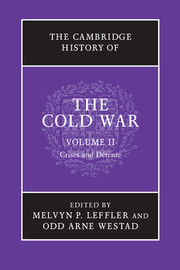Book contents
- Frontmatter
- 1 Grand strategies in the Cold War
- 2 Identity and the Cold War
- 3 Economic aspects of the Cold War, 1962–1975
- 4 The Cuban missile crisis
- 5 Nuclear competition in an era of stalemate, 1963–1975
- 6 US foreign policy from Kennedy to Johnson
- 7 Soviet foreign policy, 1962–1975
- 8 France, “Gaullism,” and the Cold War
- 9 European integration and the Cold War
- 10 Détente in Europe, 1962–1975
- 11 Eastern Europe: Stalinism to Solidarity
- 12 The Cold War and the transformation of the Mediterranean, 1960–1975
- 13 The Cold War in the Third World, 1963–1975
- 14 The Indochina wars and the Cold War, 1945–1975
- 15 The Cold War in the Middle East: Suez crisis to Camp David Accords
- 16 Cuba and the Cold War, 1959–1980
- 17 The Sino-Soviet split
- 18 Détente in the Nixon–Ford years, 1969–1976
- 19 Nuclear proliferation and non-proliferation during the Cold War
- 20 Intelligence in the Cold War
- 21 Reading, viewing, and tuning in to the Cold War
- 22 Counter-cultures: the rebellions against the Cold War order, 1965–1975
- 23 The structure of great power politics, 1963–1975
- 24 The Cold War and the social and economic history of the twentieth century
- Bibliographical essay
- Index
- References
8 - France, “Gaullism,” and the Cold War
Published online by Cambridge University Press: 28 September 2010
- Frontmatter
- 1 Grand strategies in the Cold War
- 2 Identity and the Cold War
- 3 Economic aspects of the Cold War, 1962–1975
- 4 The Cuban missile crisis
- 5 Nuclear competition in an era of stalemate, 1963–1975
- 6 US foreign policy from Kennedy to Johnson
- 7 Soviet foreign policy, 1962–1975
- 8 France, “Gaullism,” and the Cold War
- 9 European integration and the Cold War
- 10 Détente in Europe, 1962–1975
- 11 Eastern Europe: Stalinism to Solidarity
- 12 The Cold War and the transformation of the Mediterranean, 1960–1975
- 13 The Cold War in the Third World, 1963–1975
- 14 The Indochina wars and the Cold War, 1945–1975
- 15 The Cold War in the Middle East: Suez crisis to Camp David Accords
- 16 Cuba and the Cold War, 1959–1980
- 17 The Sino-Soviet split
- 18 Détente in the Nixon–Ford years, 1969–1976
- 19 Nuclear proliferation and non-proliferation during the Cold War
- 20 Intelligence in the Cold War
- 21 Reading, viewing, and tuning in to the Cold War
- 22 Counter-cultures: the rebellions against the Cold War order, 1965–1975
- 23 The structure of great power politics, 1963–1975
- 24 The Cold War and the social and economic history of the twentieth century
- Bibliographical essay
- Index
- References
Summary
The importance of France’s role in the Cold War is often overlooked when compared with that of both the two superpowers and the other major West European countries. Germany self-evidently occupied a central position in the East–West conflict from its inception and was a decisive actor at its end, and Britain’s role during the Cold War was much enhanced thanks to the “special” relationship with the United States. By contrast, the French contribution often comes across as less important. This may be partly explained by a comparatively modest French input in the historiography, especially in the English-speaking literature. Yet the perception of France as a lesser player in the Cold War is misleading.
To be sure, the country was in a somewhat peripheral position at the very beginning of the East–West conflict. Wartime leader Charles de Gaulle and – following his withdrawal from politics in January 1946 – his immediate successors were indeed reluctant to accept the emerging logic of the Cold War and its consequences. By the late 1940s, however, the intensification of the Cold War had led to the country’s active alignment within the West, thus making France a key protagonist in the East–West conflict. Yet France’s position in the Cold War soon provoked a number of frustrations that the country’s painful decolonization process and chronic internal instability only aggravated, and these tensions together played no small part in the demise of the Fourth Republic and General de Gaulle’s return to power in 1958.
- Type
- Chapter
- Information
- The Cambridge History of the Cold War , pp. 158 - 178Publisher: Cambridge University PressPrint publication year: 2010
References
- 6
- Cited by

